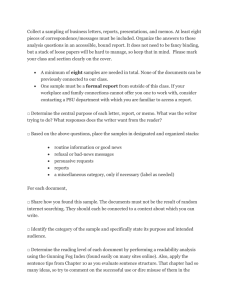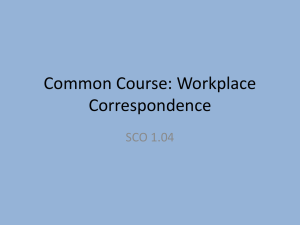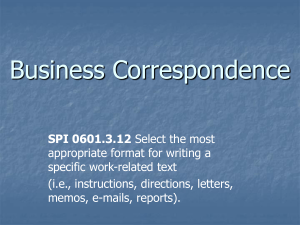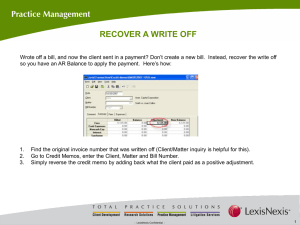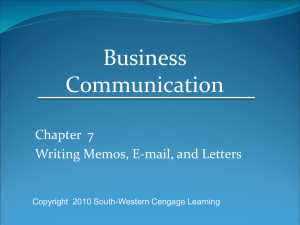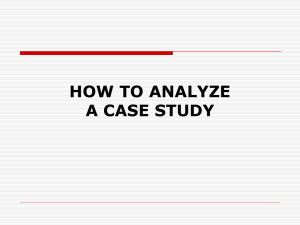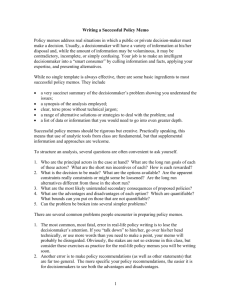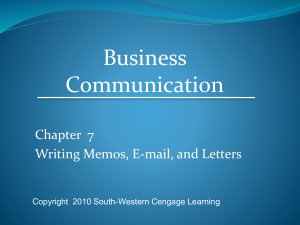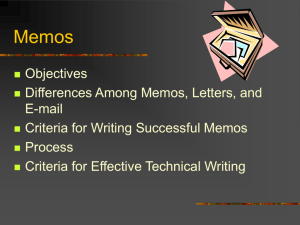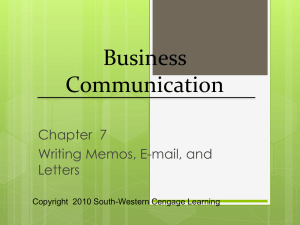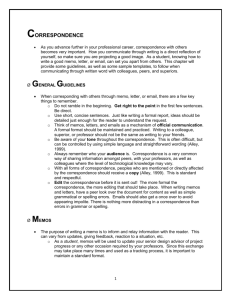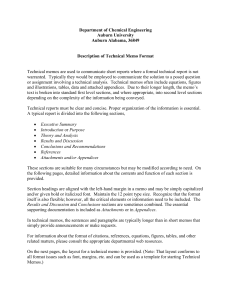BUSINESS CORRESPONDENCE
advertisement
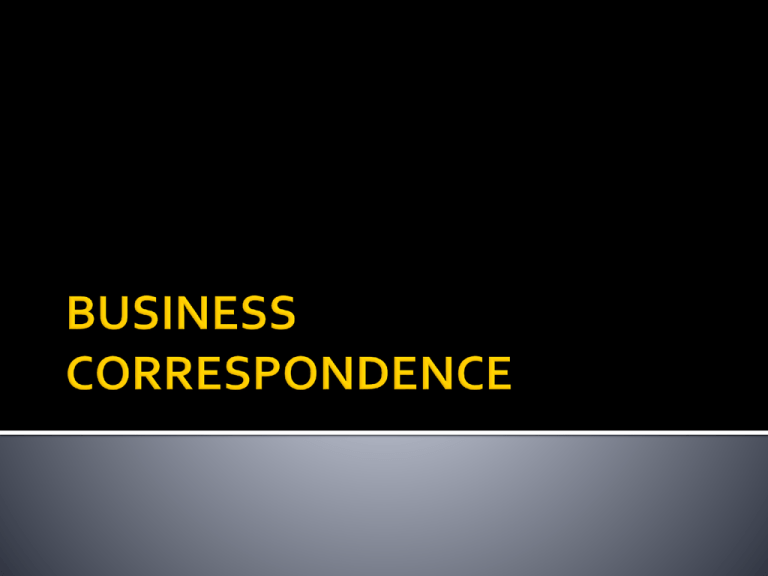
Business correspondence is an instrument of decision making in the business world. Business correspondence includes all types of notes, minutes, memos, letters as well as electronic mails and messages. Correspondence does not exist in a vacuum nor does it have a rigid format prescriptions. Correspondence provides a record of transactions in business and industry that can be referred to and checked. PROCESS OF WRITING Analyse your audience Analyse your purpose Gather information about your subject Choose the type of document- letter, e-mail, memo Draft the document Format the Document Revise, edit and proof read the document Use the appropriate level of formality Communicate effectively Project the “you attitude” Avoid correspondence clichés Communicate honestly USE THE APPROPRIATE LEVEL OF FORMALITY Letters, memos and emails are legal property of the organization; they are archived digitally. They may be read by the president, appear in the newspaper or court of law. Therefore, use moderate tone to avoid potential embarrassment. Informal- Our meeting with H&R Sons went south right away when they threw a hissy fit, saying that we blew off the deadline for the progress report. Formal- In our meeting, the H&R Sons representative expressed concern that we had missed the deadline for the progress report. COMMUNICATE CORRECTLY Correct writing is writing that is free of grammar, punctuation, style, usage and spelling errors. These problems are often highlighted in e-mails. Letters, especially, represent the organisation to the public ; therefore, inappropriate use of mechanics, grammar reflect negatively on the organization's image. This is unprofessional since it suggests a lack of respect for your readers and yourself. It also causes your readers to think that you are careless about your job. Ensure that your message is accurate and unambiguous. The message should be concise and direct. Direct language should be used in order to avoid confusion and misunderstanding. PROJECT THE “YOU” ATTITUDE This entails knowing your audience. Correspondence must always convey a positive tone. This is done by using the “you attitude”, that is, looking at the situation from the reader’s perspective or point of view. The content, structure and tone should be adjusted to meet the readers’ needs. Your explanation should be clear and polite. Speak directly to the individual, addressing their individual needs and interests. This is achieved by using the personal pronoun “you". The writer should use a professional ,courteous tone. Avoid correspondence clichés- vague and unclear words/expressions should be avoided Letter clichés Attached please find “Referring to your letter on March 19, the shipment of pianos…” “The writer believes that…” Natural equivalents attached is “As you wrote in your last letter on March19,2012 …” “I believe…” Communicate Honestly Communicating honestly show respect for your audience. It is a clear sign of professionalism. The message should be simple and clear for the readers to understand so that they are able to respond to it accordingly. Ideas within the message should be separated within paragraphs. 1. It is with great pleasure that we acknowledge with thanks the receipt of your letter, which you sent on 20/6/2004 and we received on 06/06/2004. 2. I am sorry to tell you that I have had nothing but trouble with both my new Pajero and your firm since I bought my new car from your firm in February,2008. 3. In response to your letter datedMay4,2008, we are pleased to inform you that consequent to the receipt of your cheque for no. 57223- we are sending you your HP Pavillion 1530 Desktop. As promised , we are sending you several free gifts, which include a HP Digital Camera P5435, Britannica Encyclopedia 2008DVD, and a Photo Lab software. ELEMENTS OF LETTERS Heading Date Inside address (Attention line)- this is not always written Salutation Subject line- this is expressed in a phrase; it is not needed for every letter Body Complimentary closure Signature Enclosure Copy line FORMATS Modified block format- Full block format- everything aligned along the left margin TYPES OF LETTERS Letter of application Letter of Recommendation Letter of Resignation Inquiry letter Response to an Inquiry Claim Letter “ good news” or “bad news” (polite reasonable complaint) Adjustment letter “good news” or bad news”( response to a claim letter) Transmittal letter TYPES OF LETTERS Persuasive Messages Letters urging action- these usually begin with an attention line Letter to Raise Funds Request letters Order letter Body of Letters Include subject line if possible Organize material in direct and descending order INTRODUCTION- this states the purpose of the letter. The letter should open with a clear statement that tells the reader why the letter is being written. BODY- the body gives details that explains the purpose of the letter. It may begin by justifying the importance of the main point, the next few paragraphs may contain more information and supporting details. CLOSING- the purpose is usually restated. The letter may end with a goodwill expression seeking an action- oriented response. The conclusion states what action the writer wants the readers to take. Sample Business Letter (structure) Business Logo Address Phone, Fax, and/or Email Website URL Date of Letter’s Mailing Name of Addressee Address Salutation Subject line Opening …………………………………………………………………………….. Body………………………………………………………………………………….. Closing……………………………………………………………………………… Complimentary closure Signature OC: mJ Enclosure C Dear Ms. Chopra, I have gone through the letter sent by your office last week. Please be advised that our company can accept the offer to which the letter refers because it would be beneficial for our company in several ways. Infact, we have been looking for such innovation programmes for our junior executives for a long time but no training and consultancy company came forward to send us this interesting proposal. We have gone through the structure of the workshop and find it exhaustive and inappropriate. However, the workshop may not be effective unless it includes some project work relating some important areas of artificial intelligence. Moreover, our company may not be able to upgrade the knowledge level in this regard on a continuous basis unless the project work is included. There is no doubt that you have worked hard to design the structure of the programme so that it is suited for our needs. Nevertheless, we would not be able to take any action unless we receive your final proposal. Send this positively by the end of May, 2012. With regards, Yours sincerely, Mr. Singh Here the columnist uses linguistic structure resembling the Guyanese orthographical structure which bores much resemblance of the phonological Dear Mr. Chorpra, Please refer to your letter no. HD(ELE) /176, dated March 29,2012, containing the proposal to conduct a special workshop on Artificial Intelligence for the junior executives of our company. I have gone through the structure of the Artificial Intelligence module and find it exhaustive and appropriate. However, you may consider including the initiation of some specific project work relating to artificial intelligence. This may help us in continuing our efforts to upgrade the knowledge level of our executives in this regard on a continuous basis. It gives me immense pleasure in acknowledging the effort that you have put in to designing the structure of the module, which is appropriately suited to our needs. I would appreciate if you could send us the final proposal by the end of May,2012. We look forward to hearing from you. Yours sincerely, Radseh Prasad Memos are the workhorses of business communication, used for the routine, day to day exchange of information within an organisation for internal communication. A business memo is a formal written message written in a conventional form for someone within the organisation to meet a specific need. They help solve problems and act as a means of decision making. (Rizvi, 2005) Business memos describe problems, inform employees, request information or additional resources, explain actions and policies, provide direction and give feedback. (Rizvi, 2005) Good memos discuss one topic. They are less private than letters. CHARACTERISTICS I. describe problems 2. request for information or additional resources 3. contain proposals or request for proposals 4. explain policy statements 5. contain office instruction or guidelines 6. persuade the reader to take action 7. invite the reader to business meetings and conferences 8. give feedback suggestions and recommendations 9. seek explanations and clarifications 10. polite reminders There are usually 1. upward memos – subordinates to supervisors 2. downward memos- supervisors to subordinates Memos should be clear- simple, specific and familiar words. Avoid clichés and overused proverbs and phrases concise- essential information- Unnecessary repetition of words, and explanation should be avoided. unified according to theme- ensure the memo discusses one specific topic informal tone- the tone is usually conversational HEADING a) Date: (complete and current) b) To (Name and designation of the recipient) c) From: ( name and designation of the sender) d) Subject: (Topic of the memo usually expressed as a phrase) OPENING- states the basic purpose (central idea) of the memo. BODY- contains the message of the memo. It describes, explains and discusses the central idea of the memo. CLOSING- states what action the reader is required to take. SIGNATURE- (this is sometimes used) HEADING Date: March 6, 2012 To: Rakesh Singh, System Administrator From: Roy David, Marketing Executive Subject: Seminar on Telemarketing Strategies SYNDICATE Consultancy Services Ltd. 234 South Road , Georgetown Date: March 7,2012 To : All employees From: Anil Marks, Director (sales and Marketing) Subject: New Health Scheme ______________________________________ OPENING The company is introducing a new health scheme called SCS Health Plan. You will receive your medical card and a booklet outlining the terms and conditions of the scheme by June 30,2012. BODY The main features of the SCS Health Plan include: • Medical reimbursement for treatment at private hospitals and clinics. • Direct payment of medical expenses to ALLMS and other important national hospital. • Medical facilities for retired staff • Token system at SCS Hospital. SCS Health Plan is compulsory for all employees of the company. The use of the medical card is mandatory. CLOSING I am sure the health scheme will improve the existing medical facilities and would benefit our company. We encourage you to use your medical card you visit a health centre or the SCS hospital and follow the guidelines contain in the brochure. Your cooperation in this matter will be greatly appreciated. Anil Marks Write a memo to your office supervisor explaining to him or her why you have been coming to work late. Electronic –mail is the medium of communication that sends and receives messages through specially designed computer networks. It has become the most popular medium. They help to enforce professional relationships. They are means to reach people both inside and outside the organisation. NETIQUETTE Mediated Communication is a Tool: Using new communication technologies such as listservs, videoconferencing, discussion boards, and email will not solve a group's problems. These technologies are simply tools that group members can use to communicate with each other and those outside the group. Netiquette It's likely that Internet tools will provide most of the mediated communication in which your group engages. Netiquette refers to etiquette on the Internet. The guidelines below generally apply to email, listservs, chat rooms, and discussion boards. Read messages carefully to make sure that you understand them. Carefully read what you send in order to reduce misunderstandings Desist from using label humor or sarcasm. One method for this is using emoticons, such as 8) ;-) :-). These should not be used in formal emails. Know your audience. Make sure that the people to whom you are sending your message are members of your intended audience. Be patient with people new to listservs, discussion boards, email, and other communication technologies. Keep messages as straight-forward and concise as possible. Recipients may hit the "delete" button if they see a lengthy, cluttered, and unclear message. Quote relevant parts of a message to which you are responding so the original sender (or others who may read the email) understands the context of your response. Make sure your name and the message's subject are included. Focus on one topic in each message. If you try to cover multiple topics, some of your points may be missed. Type in lowercase. Uppercase means that you're SHOUTING. Keep in mind that for many Internet users, and possibly members of your small group, English is not their first language. Ask senders for clarification before making judgments and jumping to conclusions. STEPS WHEN WRITING AN E-MAIL Before you write an email ensure that you are aware of the organization’s e-mail policies. Most organizations have strict policies that discuss circumstances under which you may or may not use e-mail. When you write emails, adhere to netiquette standards. Stick to business. Do not send jokes or other non-business messages. Don’t waste bandwidth. Keep the message brief; when you reply to a former email do not quote long passages. Write correctly- you should edit, and proofread your e-mail before sending them. Do not FLAME. To flame is to scorch the readers with scathing criticism, usually in response to something that the person wrote in a previous message. When you are angry keep your hands away from the keyboard. Make your messages easy on the eyes. Use uppercase and lowercase letters, and skip lines for paragraphing where necessary. Do not forward a message to an online discussion forum without the writer’s permission. Doing so is unethical and illegal; the email is the intellectual property of the writer. Do not send an email unless you have something to say. CORRECT THE FOLLOWING E-MAIL TO: METRO COPY CENTRE SUBJECT: LATELY WE HAVE BEEN MISSING LASER REPAIR FILES FOR OUR 16MEG WAFERS. AFTER A BRIEF INVESTIGATION, I HAVE FOUND THE MAIN REASON FOR THE MISSING DATA. OCCASIONALLY SOME OF YOU HAVE WRONGLY PROBED THE WAFERS UNDER THE CORRELATE STEP AND THE DATA IS THEN COPIED INTO THE NON PROD STEP USING THE QRT PROGRAMME. THIS IS REALLY STUPID. WHEN DATA IS COPIED THIS WAY THE REPAIR DATA IS NOT COPIED. IT REMAINS UNDER THE CORRELATE STEP. TO AVOID THIS PROBLEM, FIRST PROBE THE WAFERS THE RIGHT WAY. IF A WAFER MUST BE PROBED UNDER A DIFFERENT STEP, THE WAFER IN THE CHANGE FILE MUST BE RENAMED TO THE ** FORMAT. EDITING THE WAFER DATA FILE SHOULD BE USED ONLY AT THE LAST RESORT, IF THIS BECOMES A COMMON PROBLEM, WE COULD HAVE MORE PROBLEMS WITH INVALID DATA THAT THERE ARE NOW. METRO COPY CENTRE: PLEASE PASS THIS INFORMATION ALONG TO THOSE WHO NEED TO KNOW. ROGER PRICE
